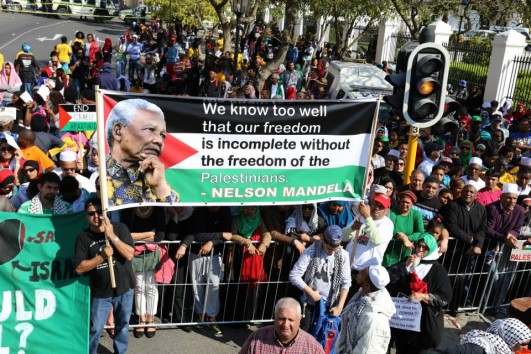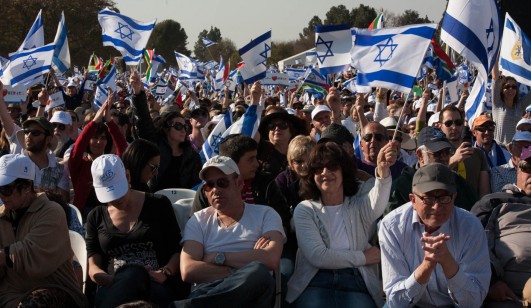In South Africa’s highly polarized debate on Israel-Palestine, the organized Jewish community’s refusal to acknowledge the unequal treatment of Palestinians at the hands of the Israelis is seen as emblematic of all that apartheid stood for.
By Heidi-Jane Esakov
In what is being touted as one of the biggest demonstrations in Cape Town since Nelson Mandela’s release from prison, South Africans took to the streets last Saturday in their thousands in opposition to Israel’s ongoing assault on Gaza. Estimates vary, with some reports suggesting tens of thousands and others over 100,000 marchers taking part in the protest. A day later, Cape Town’s organized Jewish community held a modest rally of between 3,000 and 5,000 in solidarity with Israel.
For many South Africans this conflict feels deeply personal. Across religion and race many identify with the Palestinian cause and see the conflict as an extension of their own struggle against apartheid. In turn, for many Jewish South Africans, Zionism is central to their identity. The relevance for South Africans is further heightened with South Africa’s apartheid experience playing a significant role in how the Palestinian-Israeli conflict is being framed and understood at the global level.

I am a South African non-Zionist who supports the Palestinian civil society call for BDS. My husband-to-be is an active Zionist and is deeply committed to the Zionist project in South Africa and Israel. Despite the deeply polarized nature of the discussion here, we have muddled our way through our often painful differences to develop a profound respect for each other. In doing this, we have had to recalibrate our language so that we can hear the other. When describing to him how I understand the situation, I now avoid words like ‘ethnic cleansing,’ ‘racist’ and ‘apartheid.’ They simply shut him down.
Yet, since the commencement of Israel’s latest assault on Gaza on July 8, 2014, we have been driven by primal emotions, and our words mostly mangle each other. We are, however, deeply committed to each other and holding this space. It is not easy, and if we are struggling and angry, considering the prominence of the Palestinian-Israeli issue in South Africa, it is perhaps inevitable that South Africans that align either with Israel or the Palestinian cause will also feel deep anger and resentment towards each other.
The conflict has also had implications for South African communities that identify with either Israel or the Palestinians. It is not only affecting inter-communal relations in South Africa, particularly between its Jewish and Muslim communities, but also arguably communal identities. Aside from most South African Jews identifying as Zionist, it is not uncommon for members of either community to speak in the language of ‘we’ and ‘us’ when referring to Israelis or Palestinians. Political parties openly align to either side, with the governing party, the African National Congress, and the Economic Freedom Fighters throwing their weight behind the Palestinian cause. The smaller African Christian Democratic Party and Inkatha Freedom Party, in turn, have come out in vocal support of Israel.
With around 1,928 Palestinians killed, the majority civilian, including many children, it has been particularly hard for South Africans sympathetic to the Palestinian cause not to feel and express anger at Israel’s recent actions. Israel’s death toll currently stands at 67: 64 soldiers, two Israeli civilians and one foreign worker.

The context makes this assault even more painful for South Africans who identify with a colonial experience. Despite Israel’s unilateral withdrawal from Gaza in 2005, effectively, Gaza remains occupied. In fact, Israel’s staunchest ally – the U.S. – acknowledges that Israel has occupied Gaza since 1967.
Pro-Israel advocates here would no doubt accuse me of feeling more for Palestinians than for Israelis; for condemning Israel but not unequivocally speaking out against Hamas and the rockets fired on Israel; for not feeling the pain and fear of Israelis; and for not adequately condemning the rise in anti-Semitism in South Africa. And they are right. In this polarized space, I fear that commenting on that would be used to deflect from or undermine what Gazans are experiencing, and the broader context of an ongoing occupation of Palestinian lands.
Emotions are currently running high in South Africa. Even before the weekend’s mass march, South Africans had taken to the streets in their thousands to stand in solidarity with Gaza. A counter pro-Israel rally was held by the organized Jewish community in Johannesburg and drew crowds of thousands. South Africans sympathetic to the Palestinian cause have taken grave offence towards the seeming intransigence of the organized Jewish community in South Africa. Its unequivocal support for Israel and seeming lack of concern for Palestinian lives is often filtered through South Africa’s own history and experience of apartheid. Within that polarized space, South African Jews have come to embody whiteness in their refusal to acknowledge the unequal treatment of Palestinians at the hands of the Israelis and are seen as emblematic of all that apartheid stood for. This is seeing heated challenges on an insecure community that might be economically privileged but is politically relatively powerless.
In this turbulent period I have called my fiancé a ‘right-wing fascist,’ he has called me a ‘Hamas-apologist,’ but our mutual affection and respect has compelled us to find a way forward. For most vested in the Palestinian-Israeli issue, however, the anger wrought by the situation will not be mediated by such an understanding and empathy. Anger here will continue to simmer after a ceasefire is reached.
South Africa remains a deeply divided society and what is happening in Israel and Palestine threatens to further exacerbate these divisions. None of this should deflect from what is happening in Gaza, however. The sad reality is that once this assault is over, nothing, except for an increase in suffering, will have changed for the besieged people of Gaza.
Heidi-Jane Esakov is an independent researcher and PhD student based in Cape Town, South Africa.
Related:
The world is letting Israel get away with it again
Can South Africa provide the inspiration that Israel needs?
On Mandela’s legacy: Three political innovations

